 |
| Cat flea. Image: MikeB |
Worms
 |
| Mother cat and her newborn kittens. Pixabay. |
 |
| Cat flea. Image: MikeB |
 |
| Mother cat and her newborn kittens. Pixabay. |
 |
| For how long should I cuddle my cat? The short answer is not long. Image: MikeB. |
These are my unresearched views on the topic. Please share yours in a comment as I'd be pleased to hear from you.
For how long should I cuddle my cat? This is a question people ask on the Internet. The short answer is not long (normally, but there are exceptions). How often do you see cats cuddling each other? And if you do see one domestic cat with their 'arm' (foreleg) around the other (which happens) for how long do they do this? To the first question the answer must be rarely if not sleeping together and to the second question the answer must be for a short time (unless sleeping together).
Domestic cats regard us as surrogate mothers. That's why we keep them in a mental state of kittenhood. On that basis, they wouldn't expect to be cuddled, human-style, by their feline mother other than for a short time unless they are sleeping together. That's a point worth making I feel.
There is probably a bit of an exception here. Sometimes cats can settle down on a cold winter's night with their human and spend hours with the arm of their caregiver around them. A quiet, gentle cuddle. But this is I feel an exception to the general rule.
It is a state of affairs where humans can share their behavior with cats and dogs.
 |
| Cat cuddles a dog friend sleeping. Image in the public domain. |
This is really about a clash of cultures. The human race has a culture of cuddling each other when needed. And it is needed quite often as a form of reassurance and friendship. It can be part of a greeting or a departure. It's a sign of affection indeed love. We know all these things.
But domestic cats don't have the same culture. When they greet in a friendly way, they do so with their tail held erect with the end just flopping over slightly (tail-up greeting). They might touch noses having approached each other (the nose touch greeting).
In subsequent interactions they may rub against each other flank-to-flank. One cat's tail made curl over the other cat's back. These behaviours happen quite fleetingly. They are delicate movements.
But as mentioned there can be long-term cuddle contact when resting and sleeping.
 |
| Devon Rexes cuddle. Image in public domain. |
The human cuddle is quite a forceful action. There is an element of squeezing in the human cuddle. This is likely to be uncomfortable for a domestic cat even if they have a close bond with their human caregiver.
And of course, the cuddle means that the two parties are in very close proximity. They are in contact. The human is much larger than the domestic cat. We can be intimidating. They live in a land of giants. We need to be sensitive to that.
If we place our head close to their head, they can feel intimidated. If we squeeze them at the same time, it can be uncomfortable as mentioned. These elements combine to make the experience perhaps tolerable but not particularly enjoyable for some cats.
And if it is enjoyed because they become habituated to it as it happens a lot, they'll normally accept it for a relatively short period of time perhaps around 30 seconds.
In fact, domestic cats tell you when they want to get down or stopping cuddle. They may wriggle a bit or if you are carrying them at the same time as you see in the picture, they may twist their bodies and look towards the ground to indicate they want to get down.
The answer comes from observing domestic cat behaviour. Domestic cat behaviour is the product of evolution of the African wildcat. This wildcat is solitary. The domestic cat has learned to be sociable within the human environment.
But essentially this solitary character is within the domestic cat and this is the last factor as to why domestic cats will normally accept being cuddled (but not always because it depends upon the individual cat's character) but for a time which is shorter than the human would wish for.
It perhaps is worth reminding ourselves that when we cuddle our cat, we often do it mainly for our benefit. We are seeking reassurance. We are looking for a friend and companionship. So, we do it for ourselves and therefore we can only expect that our cat will accept it rather than seek it.
That said, each cat has their own personality as mentioned and therefore sometimes cats will ask to be picked up and cuddled if, in the past, they have learned to understand that it is a sign of friendship from the human caregiver and enjoyable. Cats do pick up on human behavioral traits and some learn to copy them or integrate them into their livestyles.
 |
| Newborn kittens. Image: MikeB |
"Most queens [breeding mother cats] display anxiety when their very young kittens are constantly handled by unknown people or if unfamiliar pets or other household animals [that] they are not comfortable with are allowed near the kittens."
 |
| Image: MikeB - Gen Z pet owners (ages 18 to 25) are far more likely than other age groups to have a variety of pets. |
In a rather nasty development, trophy hunters are threatening to sue a British Member of Parliament, Sir Roger Gale, because he used photographs of trophy hunters with their kills in an All-Party Parliamentary Group on Banning Trophy Hunting report dated June 2022. This looks like the trophy hunters are using their intellectual property rights to try and delay the passage of the bill to ban the importation of trophies into the UK and to send out a general signal to others.
The report contains 78 photographs. The trophy hunters are demanding £1200 per photograph. They are therefore demanding a grand total of £93,600. And if they don't pay up, they are going to sue him they say.
I have used photographs of trophy hunters with their kills on my websites and criticised them heavily for obvious reasons. It concerns me that they may try and sue me as well. But if they sue me, they'll have to sue thousands of others and newspapers. It is not going to happen which is why they've targeted on special document.
I have always stated that these photographs have ended up in the public domain through general usage. And in addition, I would plead fair use because it is highly important that people are educated about trophy hunting and its cruelty. It has to stop. In the interests of the planet generally and wildlife particularly, trophy hunters must be stopped.
And this is also in the interest of humankind's attempts to interact with animals in a humane manner. I'd be disappointed if a judge found in favour of the hunters. They might as technically this might be seen as a breach of copyright.
The argument that trophy hunting improves conservation of wild species is highly erroneous. You can't kill animals to protect animals. Logic dictates that. But the trophy hunters constantly wheel out these poor arguments to defend their obnoxious habits.
As I said, this is a worrying development. The report comes from PA Media. A group of sport hunters say that the photographs which show them posing with their dead animals, often lions, have been used without their permission and they are therefore entitled to payment.
But who owns the photographs? That's the big question. I guess they were taken by the sport hunters or friends of the sport hunters. But they've found their way into the news media. I would bet my bottom dollar that the news media have not paid for these photographs.
The photographs are all over the Internet by the way. The photographers have done nothing about that. They can do nothing about it as it is too widespread. But this, to me, has resulted in the photographs being in the public domain. By implication, the photographers have accepted their presence. That's my argument. It might not be a completely solid one but nonetheless that's what I would state.
The important aspect of this is that you would plead fair use for educational purposes. Sport hunting is so immoral in my view that it justifies using someone else's photograph without their permission in order to bring about a ban on this practice.
And the British government would agree that because they are in the process instigating a ban on the importation of trophies by sport hunters into the UK.
The man asks on Reddit.com whether he behaved badly (AITA) when he felt he was forced to rehome some rescue cats that his girlfriend had found. The title sort of indicates that he might have behaved badly but when you read the story carefully, he hasn't at all.
 |
| Reddit's AITA category for discussion. |
He works from home and he owns his home. His girlfriend of two years lives with him in his home. She also works from home. She does not pay rent.
She found a box of 6, 2-week-old abandoned kittens by the side of the road (that stuff happens which is appalling). She asked him whether she could bring them in to the home and he agreed even though he has a severe cat allergy. Although he asked whether she could take them to a shelter but she didn't want to do that and he relented.
But he said he would allow them to come into his home on condition that she adopted them out at eight weeks of age. In the meantime, they should stay in the guest room/bathroom. And he agreed to look after them if he had to in an emergency otherwise the responsibility was his girlfriend's.
After four months they were still in the house and they needed fixing i.e. spaying and neutering and he did not want the expense. Also, they were now roaming around the house. His girlfriend tried to get him to clean the litter tray because she didn't feel like it, he said.
He said that his allergy to the cats was a real problem for him and that he had to constantly take precautions like wash clothes et cetera to minimise the allergic reaction.
He told her three weeks before he adopted them out that he would do so. Eventually he posted them on Facebook offering them for adoption. She agreed to it.
A couple of people responded and met with him. She agreed with that as well. As a result, four of the cats were adopted out. She appears to have been out of the home at the time and when she returned, she "flipped her shit".
He was very surprised. He said that she was angry because he didn't let her say goodbye to them. He said that he gave her two months of goodbye time. He asked AITA?
 |
| Alternative cat show commentary of a Persian cat by a veterinarian. Screenshot. |
I suppose I should not harp on about the Persian too much but it is the paradigm example of cat breeding gone wrong. Someone in the cat fancy decided in the 1950s that flattening the face of this once beautiful cat (c.f. the doll-face Persian) would make it more attractive. How did they figure that one out?
Clearly the peke-faced, punch-face in India, Persian is less attractive than the original Persian. The point is that it is more interesting looking. It is more extreme in appearance and people like something different whatever the 'product' is.
But in flattening the face they distorted the internal anatomy in the head which leads to health issues and breathing problems.
35% of Persians also suffer from PKD; polycystic kidney disease. This describes cysts on the kidneys. Not good, right? People should protest and stop buying the flat-faced Persian until the cat associations make it mandatory to breed healthy Persians by disqualifying all flat-faced ones from cat show competitions.
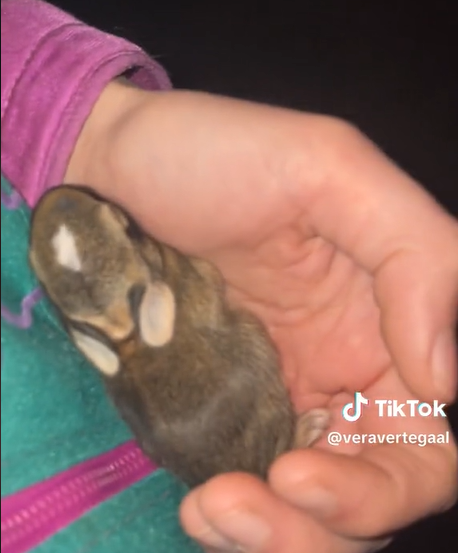 |
| Cat brings baby rabbit home and identifies mother's nest so it could be returned to its siblings. Screenshot from video below. |
@laurenjenel12 Did we sleep at all? Yes. Was it good sleep? 🤷🏻♀️ #fyp#befypoupage #catsoftiktok #cattok #catsvideosoftiktok #securitycamera #blinksecuritycamera #trending #laurenjenel12 #catsvideo ♬ original sound - The preppy three🌸
Domestic care are generally 'crepuscular' meaning active at dawn and dusk but they can be active at any time, often at night. Their circadian rhythm certainly clashes with ours.
Humans normally have very set patterns of sleep and activity. When it is dark it is time to sleep. When it is light it is activity time. No so for the domestic cat who sees night time as great opportunity to find prey animals as they are often active at night to avoid predators!
The desire to go hunting at night is present for full-time indoor cats when prey is never available. Many domestic cats will adjust their lifestyle under these circumstances and reduce their nighttime activities. I don't think they'll squeeze them out of existence. That is asking too much.
They will subdue their instinctive desire to be active when their caregiver sleeps to fit it. To match the human circadian rhythm - sometimes.
The problem we see in the video is perhaps the biggest 'culture clash' between the human and cat. It is a barrier to a successful relationship.
Cat owners overcome it. They get used to having their cat bite their arm to try and wake them up or prick their nose with the middle claw of their favoured paw.
These two methods to wake up humans are very typical of domestic cats.
NEWS AND COMMENT: A spokesperson for PETA said:
"Grimsby – the centre of the UK’s “seafood” processing industry is catching some heat from PETA with a new lenticular billboard – showing a smiling fishmonger holding a limp fish from one angle and a dead cat from another – urging locals to see fish as intelligent, sensitive individuals and opt for vegan fare instead."
PETA chose Grimsby, UK because it is a fishing town; historically connected with fishing and they put the sign outside a fish and chip shop.
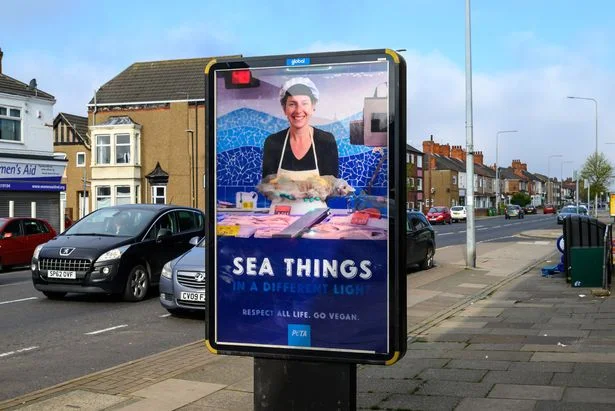 |
| PETA compares eating fish with eating dead cats. Image: Grimsby Live. |
Apparently if you look at the billboard poster from different angles you either see a fish or a dead cat.
A clever aspect of the billboard is the use of the word 'sea' which sound like 'see'. They are asking people to see more clearly what they are doing.
As you can tell from the statement at the top of the page, PETA want people in general to consider fish as sentient beings. And further they want people to opt for a vegan diet.
Personally, I am also pushing for fish welfare. A study has found that fish feel pain (link below). Because millions of fish have been caught over the years, it seems that human kind regards fish as harvesting wheat and not killing billions of animals in a painful way through suffocation.
RELATED: Fish endure prolonged suffering due to a failure to stun them before slaughter.
It's time for a change. It's a time to change the perceptions of the general public. It will be difficult because the fishing community is pushing back against this poster on the sidewalk. This about protecting jobs.
And also, fish is constantly promoted as a healthy food source. It will be many years before people come off fish solely because they regard them as sentient creatures.
But things are changing because little by little people are realising that animals are sentient and have the power to feel emotions. Animal are often far more intelligent than the vast majority of people believe. Studies are gradually revealing this intelligence.
Personally, I am totally for PETA on this and in all the work they do. They push tirelessly for animal welfare and they don't mind shocking. In fact, they have decided that creating shocking campaigns is the best way to catch people's attention and change their attitudes.
I am going to have the temerity to name America's two greatest animal welfare advocates as at 2023. They are Carole Baskin and Nathan Winograd. And neatly, we can divide their efforts into two camps.
Carole Baskin is an animal advocate for cats, specifically the big cats, wild cats in general and even wildcat hybrids (she hates the idea of creating wildcat hybrids).
And on the domestic cat side, Nathan Winograd, has been and continues to be a tireless campaigner for the rights of rescue animals in America's shelters and pounds.
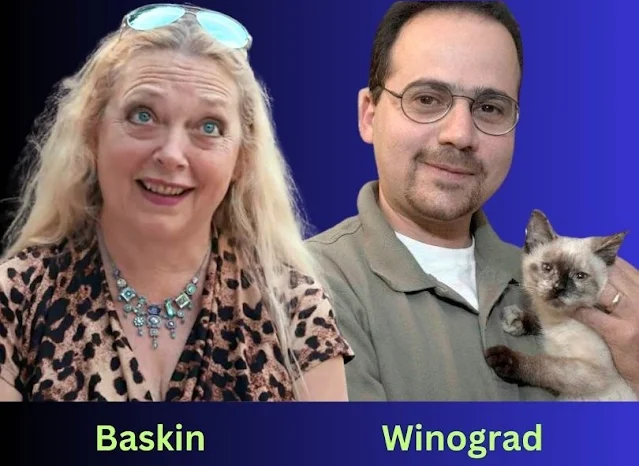 |
| Baskin and Winograd. Image: MikeB based in images in the public domain. |
You might know that she campaigned relentlessly for an improvement in welfare of big cats. There were far too many at private zoos all across America. America was and still is - until the Big Public Safety Act fully takes effect - the nation where there were the greatest number of big cat 'pets' in private zoos.
Join us in celebrating the passage of the Big Cat Public Safety Act which banned contact with big cats and their cubs, and phases out private ownership of big cats! We have campaigned for this change since the 90s and on Dec. 20, 2022 it was signed into law! This is the first step to saving wild cats, in the wild, where they belong. - Carole Baskin on BCR at May 2023.
There are an estimated 20,000 big cats kept in private ownership in the US. Carole Baskin's rescue center in Florida, Big Cat Rescue (BCR), picked up some of the pieces of bad big cat ownership.
With her job effectively done she is now selling BCR and finding alternative outlets for her passion to improve animal welfare. The substantial money that she will raise will be used in projects I understand.
Carole Baskin, almost single-handedly, instigated and forced through the enactment of the Big Cat Safety Act in the UK. It is she who has saved the abuse of so many cubs from roadside tiger and lion cub petting sessions.
And the abuse that followed with the adults becoming commercially useless beyond a certain age so what happened to them? They were probably euthanised.
The horrible exploitation of big cubs has ended. Although Carole Baskin is the prime mover and shaker in ending the private ownership of big cats in America, we have to thank indirectly a man who is currently in jail for conspiracy to murder Carole Baskin. His name is Joe Exotic. He was the biggest private zoo owner in America at one time.
He hates Carole Baskin because she was so strongly against his kind of operation. His presence motivated her. He hated her so much that he conspired to kill her. And he was found out and was successfully prosecuted for that conspiracy and animal abuse offences.
Carole Baskin triumphed over the private zoo brigade. What a woman.
Registration: The U.S. Fish and Wildlife Service of America announced on 18 April 2023 that individuals who own big cats which includes cougars and hybrids of the species must register them with the U.S. Fish and Wildlife service by the end of the day on June 18, 2023. That is in order to comply with the requirements of that act.
Current owners can keep their animals provided they are registered as per the act and provided that they abide by state and federal regulations. But once the animal's life has ended, that person will no longer be able to own and/or possess a big cat.
The act allows existing owners to continue with ownership until their zoo inventory no longer exists because of the end of the lifespans of these animals. Of course, it does not apply to bona fide zoos and other authorized establishments. It applies to John Doe, the individual who fancies possessing a big cat.
He is a great man who has fought tirelessly for a no-kill policy in all of America's animal shelters and pounds. He believes that it is possible for an animal shelter to greatly improve their rehoming of animals in their charge.
He believes that it is possible to not euthanise any or hardly any animals at shelters (90% save rate is the target) provided the administrators use all means possible to both prevent taking in rescue animals and facilitate the adoption of those animals.
By preventing intake, I don't mean physically preventing it. I mean that they should do all they can to improve cat and dog ownership in the area where they operate. There are two sides to the cat and dog rescue situation.
There are those that abandon their cats and dogs when they don't need to or they shouldn't and there are those that don't adopt those cats and dogs because they're rather buy a purebred cat or not adopt.
It's down to the people involved in organising animal shelters to tackle both those challenges in my view. In the UK, for instance, there has been a surge in adoptions i.e. purchases of purebred cats over rescue cats during 2022. According to Cats Protection, 38% of people adopted cats during 2022 adopted a purebred cat.
The point is this though that Nathan Winograd continues through his newsletters, speeches and website to improve the running of animal shelters in America to save lives.
There is one aspect of Mr Winograd's argument that I disagree with, however. He hates PETA and believes that it is an organisation which kills cats unnecessarily. Winograd and PETA have entirely different point of view on some important aspects of animal rescue. I think they should work together by finding common ground.
However, both PETA and Winograd have very strong views which means that it is unlikely they will be able to find common ground.
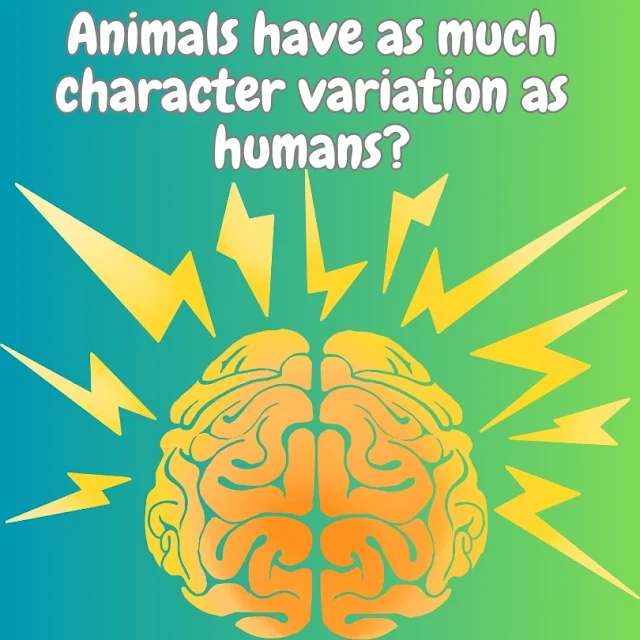 |
| Domestic cats have as much personality variations as humans! Image: MikeB |
 |
| Charles Barkley. Image: Getty. |
"Man, Chuck can never cease to surprise us with his opinions and takes. NBA Twitter heard the same and they couldn’t help but troll."
 |
| Massive rat as big as a cat. Image by MikeB based on an image in the public domain. |
The Mail Online promotes what the author considers to be a wonderful device for a cat owner. It says that you can feed your kitties from your phone. The device costs about £80. It is an automatic cat feeder which will keep your pet happy but not hungry and it can even stop them from overeating! Great.
And they start off by saying that if you go out to work during the day and then after a hard day's work you like to have a pint with your pals in a local public house, and then get home around 10 PM, you can feed your feline during those long hours apart.
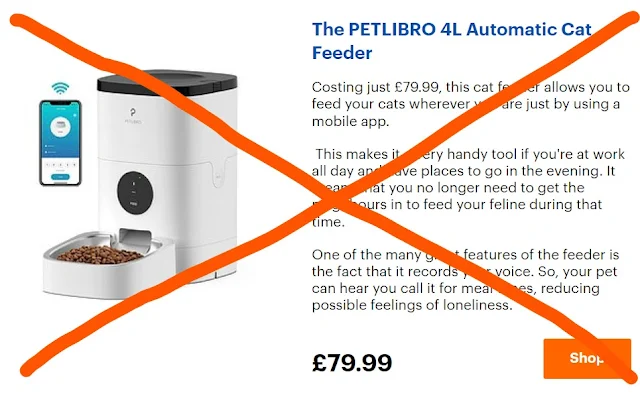 |
| Automatic cat feeder controllable by a smart phone is a bad idea. |
This must be a very poor idea for a cat owner and worse for their cat. The device promotes feline separation anxiety. It encourages people to stay away from their cat all day and long into the evening.
RELATED: How long can I leave my cat ‘home alone’?
And if their cat lives in an apartment with nothing to stimulate them throughout those long hours, what are you going to end up with? A nervous, anxious cat, stressed up to the nines. It is just not going to work.
This high-tech piece of kit feeds dry cat food all the time as it has to. It can only feed dry foods. The general consensus today is that you should feed dry cat food occasionally or perhaps at night for grazing but it is not a good idea to feed dry cat food 100% of the time because it is too unnatural.
Domestic cats do not compensate adequately for the unnatural dryness of the food which means that it keeps longer and therefore is more convenient for the owner but in terms of pure feline health it is not as good as a good quality wet cat food.
This is the kind of arrangement that could lead to the cat suffering from cystitis because there is not enough liquid in their diet and too much stress in their life. A recipe for this well-known bladder infection.
It seems, however, that the manufacturers have, to a very minor extent, taken on board what I mention above about separation anxiety. A nod to the problem and a weak attempt to deal with it.
They allow the cat owner to record their voice into the machine which then plays it back automatically. This allows the cat to at least hear their owner's voice.
Is that going to be enough? No, is the short answer. I am sorry for being so negative but I do not believe that these sorts of devices are useful. They may be worse than that. They encourage poor cat caregiving.
They encourage people to believe that they can work all day and go out all evening while believing that they are doing a good job in looking after their cat companion. I am afraid not. There is no substitute for being with your cat. With making contact with your cat. With playing with your cat. And with petting your cat.
Domestic cats like contact. They need physical contact. They want to feel the hand of their owner. They want to touch the hand of their owner. They want to sit on their lap and so on. All this is obviously impossible if the man or woman is in a wine bar chatting with his or her mates after a hard day's work.
Firstly, I don't think a person should have a cat companion if they habitually work long hours and then go to the pub afterwards. This person should suspend the idea of being a cat owner and wait until their lifestyle is more suited.
And don't believe what the bumf says about this device. It misses the most important aspect of the human-to-cat relationship: direct contact with your cat and being in the presence of your cat on a regular and substantial basis.
 |
| Screenshot. Young grey cat dressed as baby as a way of hiding drug smuggling. |
NEWS AND COMMENT-Wetumpka Alabama: this is a good news story. It is a story which tells us that there is a little bit of common sense in the American judicial system. You may remember the two elderly ladies, Beverley Roberts (84) and Mary Alston (60) who routinely fed and looked after feral cats on public property but were then suddenly arrested by the police for criminal trespass and then disorderly conduct and obstructing governmental operations.
Here is the video and below that a still image:
 |
| Elderly lady arrested for feeding feral cats in Alabama. Image: body camcorder on officer. |
To outsiders, and to 100% of cat advocates, it looked farcical. Two old ladies doing something good for the community being jumped on and stamped on by the police and then suffering criminal charges which were successfully prosecuted. They were convicted and sentenced to 2 years' probation and 10 years in jail. The sentence was suspended.
Now, the latest news is that Wetumpka is no longer pursuing these criminal charges. An application was made to the Elmore County Circuit Court to suspend the proceedings. The Latin term is "nolle pros". It means that the authorities don't wish to pursue the prosecution at this time but they can restart it in the future. In my opinion, there's no chance of it being restarted in the future.
The judge, Amanda Baxley, wisely granted the application (motion). That is the story. The judge made no comment on her order. She was just following common sense as I state. She was doing what the general public would have done.
I would be surprised if she didn't think that the whole thing was farcical in the first place. It should never have happened. It was heavy-handed. It was unnecessary.
Even if this couple of ladies were doing something technically wrong, they should have been spoken to by the police and cautioned. That would have been it. It wouldn't have made the news. The police wouldn't have been made to look stupid.
I would argue that this case did the police damage. It harmed their reputation I would argue. And all police forces need to enhance the reputation because they're often disliked.
This interesting looking small cat was bred in China and adopted by a couple in America which is very unusual in itself. It looks like the Chinese breeder is creating Chinchilla Persian-like dwarf cats. She is called Mochi. It is the first time I have heard of a Chinese cat breeder exporting internationally from the country where they eat domestic cats in the south.
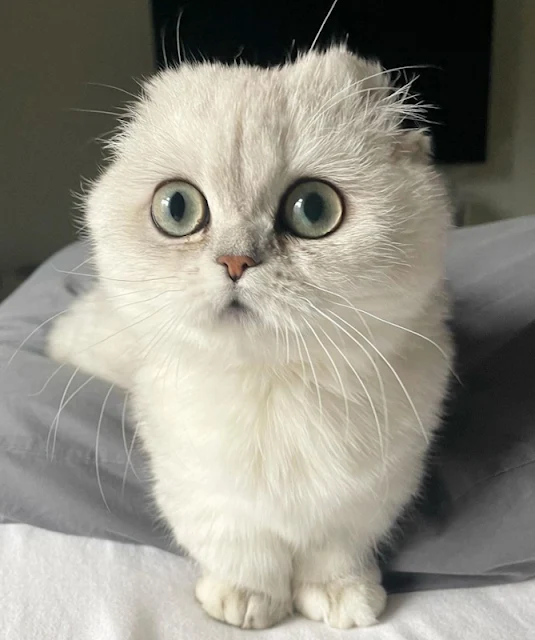 |
| Mochi. Image: Instagram (Greg McDouglas). |
Mochi has become bit of a star because of her unusual appearance. And that has come about because of a very severe illness she suffered after she arrived in America. She developed ischemic dermatopathy.
My understanding is that this was an autoimmune response which attacked her body leading to widespread inflammation which further led to necrosis in parts of her body. That's why her ear flaps were amputated and her tail. She also lost the paw of one leg
But, of course, it hasn't slowed her down one bit. She's made a full recovery and is flourishing in a home where she is deeply loved. The power of love is immense.
Mochi ended up in a shelter where she spent two months recovering.
A Boston couple, Greg and Natalia, were thinking about adopting a rescue cat and they hit the jackpot in adopting Mochi. That "jackpot" description refers to the possibility of them becoming celebrities vicariously on social media because sometimes interesting looking cats can become quite famous on social media.
 |
| Mochi in her nice home. Image: Instagram. |
Greg McDouglas and Natalia have taken super care of her. When she arrived, she weighed 2.5 pounds as a tiny kitten but has grown to a healthy 4 pounds in weight. It is a very nice home. You can feel the love.
She is infectiously cute and people love cuteness. Greg is appreciative of the luck he had in being able to adopt Mochi. And Mochi is appreciative of the luck she had in being adopted by him and his partner.
Apparently, they were selected by the shelter because they had no kids or pets and they were young adults. That's an indication of the kind of profile that you might have if you want to be selected by a shelter to adopt a shelter cat.
The shelter by the way is the MSPCA Angell shelter in Boston.
Tiny rescue kitten with a big personality 😺 |
| Spain has decriminalised bestiality!! True or false? See below. Screenshot. |
Get this! This attractive woman (speaking in Spanish with subtitles and dubbing) on TikTok explains very concisely that in Spain they have decriminalised bestiality and therefore people can have sex with dogs but because they've got restrictions on dog breeders dogs can't have sex with other dogs. Note: this applies to any animal but dogs are the chosen species in this discussion.
That is her point. And it begs the question whether she is correct because a website called The Local (local news from Spain I presume) states that Spain has not legalised bestiality.
This is her video announcement. She ends it by saying you can't kill a rat in Spain but you can have sex with it.
However, when you go to the European Parliament's website, it states, "Spanish breach of European animal health legislation". That heading is dated 6 March 2023. It is therefore recent to this post.
And I will quote them verbatim the sake of clarity. Here it is:
"Spain recently deleted Article 337 of the Criminal Code concerning sexual acts between humans and animals and replaced it with a new article criminalising bestiality if an act injures an animal to such an extent that intervention by a veterinarian is necessary.
Originally, bestiality was considered a form of animal cruelty in criminal law. The new law waters that down by stating that it is only a crime if a sexual act with an animal causes injury to the animal. This means that the left-wing Spanish Government no longer appears to assume that all non-consensual sexual acts equate to criminal sexual abuse. As if that were not bad enough, an amendment calling for a stricter approach was voted down.
New Article 340 of the Spanish Criminal Code, which no longer systematically criminalises bestiality, is in breach of European animal health legislation. One might ask who lobbied for that.
I am not going to talk about this a lot because it is too distressing. But in the photograph just below this paragraph you see a very strange, indeed weird, situation. You see lots of dogs clambering around the driver's and passenger's seat in a van parked in Hampton, Oakland, New Jersey, USA. It is just not the kind of picture you see, ever. It caught my eye and as expected it reveals a horror story behind it.
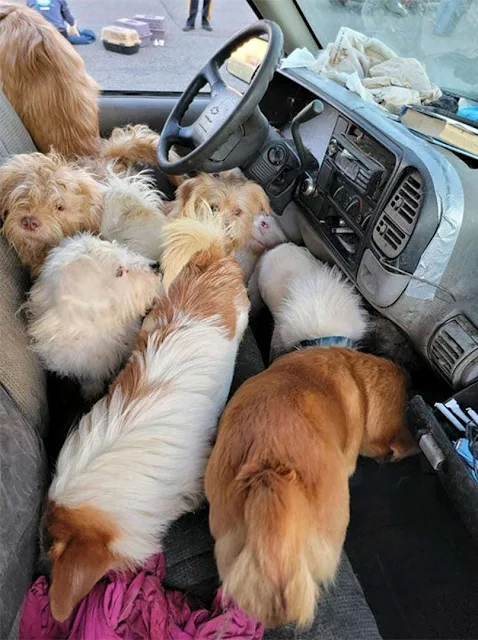 |
| Dogs inside van packed full of dead and sick cats and dogs. Image: Fox News. |
Looking at the picture you can see that the unamed woman who owns these cats and dogs was living on a shoestring. They've repaired the dashboard with duct tape. It looks very grimy. The dogs look very sad and confused.
We are told that inside the vehicle there were 38 dogs and eight cats. Rescuers made the discovery last Saturday, April 8. The vehicle had been parked for two days at least. There were dogs running around the parking lot. A foul odour emanated from the vehicle unsurprisingly.
The dogs were soaked in urine and faeces. The vehicle was packed with animals.The cats and dogs inside the truck were terrified and huddled in all corners.
Rescuers pulled them from the vehicle one by one. There were dead animals inside the vehicle which was soaked in urine, faeces and where there were animal remains. It is truly a ghastly, horrible and a horror story. It is the worst kind of animal abuse and animal hoarding.
The hoarding woman had decided to put all her animals in the van because her home in Virginia had been damaged in a fire. This had apparently forced her to live in the van with her large entourage of animals. She'd driven from Virginia to NJ.
It is such a relief, though, that they've been rescued and can start living normal lives with people who care. Ironically, then, that the person who did this thought that she was caring for them when she achieved quite the opposite. It is quite sad really. I feel for her despite the abuse she delivered to her animals. Often hoarders are borderline mentally ill.
Different rescue organisations were involved in this big job. It was Hampton animal control which were the first responders. They stayed into the late hours to rescue the animals and ensure that they had safe placements.
The identity of the driver has not been released. The information comes from Fox News Digital. They say that they have reached out to local police to seek more details.
Kolo, a male tabby cat, lived near Southmead Hospital in Bristol, UK. He clearly liked to visit the hospital particularly the Accident & Emergency department. It is not that unusual for a local domestic cat to visit an organisation like the NHS because there is no doubt in my mind that these individual cats have been left alone all day and they need the stimulation of interaction with people. That's a result of their domestication. And so, they go and find people.
 |
| Kolo. Photo: Julie White (believed). |
And if they wander into an A&E department of the local hospital and are not rejected by the people there, they will return. And that's how you develop a nice relationship between the hospital staff and in this instance Kolo.
By all accounts he was a very sweet boy. He was loved and he helped to keep the mood up in the hospital by providing comfort to the patients and they appreciated it.
Julie White, who works for North Bristol NHS at Southmead found Kolo to be a wonderful cat and she wants the staff at the hospital and visitors to remember him.
She is trying to raise sufficient funds to leave a statue in his memory and in memory of all the smiling faces he left behind thanks to his pleasant nature and company.
Lynda Johnson is one those who benefited from Kolo when she was at the hospital. She said on the fundraiser page for the statue (see below):
"Thank you, Kolo, for comforting me when I was alone at Southmead in 2021. You sat and waited for me to have my X-rays, and then again while I waited for my lift home. You will be much missed."
And a spokesperson at the North Bristol NHS Trust said:
"We were very sad to hear the news that Kolo the cat has passed away."
They added:
"We're aware a fundraising campaign has been started, and we will work with the organisers of this campaign to agree an appropriate way to remember Kolo."
So far, the campaign has raised £3,835, more than three times the goal of £1,000.
Kolo was actually injured in a car accident presumably while he was approaching the hospital or leaving it. That was always a possibility I would have thought. It is a great shame that he had to be euthanised because he was too badly injured. Not a great way to die especially for a wonderful cat who was providing a therapy service to people who needed it.
Here is a short video of him. I can't guarantee that it will function for the lifetime of this website. Sorry.
@lokkidokkey #foryourpage #fyp #cat ♬ My House - Welcome To My World